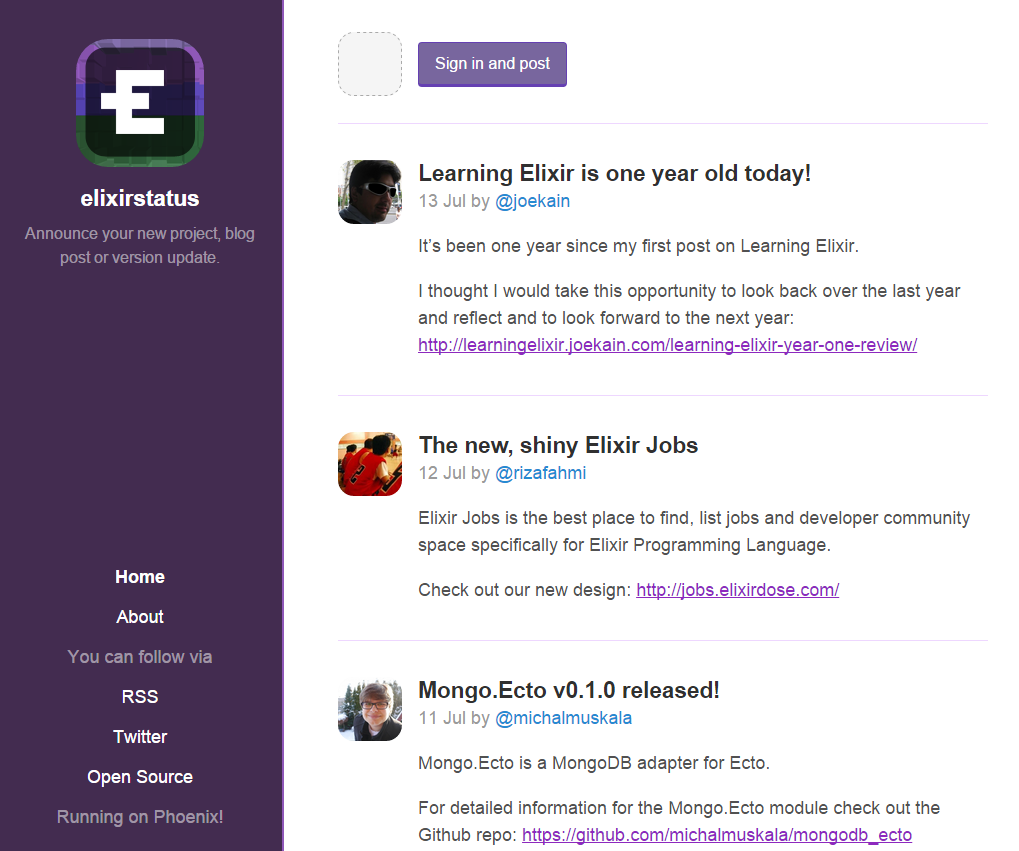https://github.com/rrrene/elixirstatus-web
Community site for Elixir project/blog post/version updates
https://github.com/rrrene/elixirstatus-web
Last synced: about 1 month ago
JSON representation
Community site for Elixir project/blog post/version updates
- Host: GitHub
- URL: https://github.com/rrrene/elixirstatus-web
- Owner: rrrene
- License: mit
- Created: 2015-06-21T20:30:30.000Z (almost 10 years ago)
- Default Branch: master
- Last Pushed: 2020-09-03T23:39:23.000Z (over 4 years ago)
- Last Synced: 2025-03-31T16:17:03.782Z (about 1 month ago)
- Language: Elixir
- Homepage: http://elixirstatus.com
- Size: 1.14 MB
- Stars: 284
- Watchers: 14
- Forks: 44
- Open Issues: 26
-
Metadata Files:
- Readme: README.md
- License: LICENSE
Awesome Lists containing this project
- open-production-web-projects - ElixirStatus - Community site for Elixir project/blog post/version updates (Elixir / Phoenix)
README
# ElixirStatus [](http://inch-ci.org/github/rrrene/elixirstatus-web) [](https://beta.hexfaktor.org/github/rrrene/elixirstatus-web) [](https://elixirweekly.net)
I already integrated Phoenix in my project [Inch CI](https://inch-ci.org/), but have not yet build a frontend site with it. I want to do this here.
This will become http://elixirstatus.com, my first *complete* Phoenix project.
## What will this be?
It will be a small site for developers to post their creations: new projects, blog posts and version updates.
No link-sharing in a wider sense, just posting your own stuff.

So it won't be a large site, but it will make up for it by being well-integrated into existing services and trends, like GitHub, Twitter, and RSS.
It will make it easy to follow new projects and blogs in the Elixir community.
## Don't we have this already?
Yes and no. I always have the feeling my project and update announcements get drowned by so much else that is out there (be it on the mailing list or on #myelixirstatus). And you can't get mentioned in Elixir Radar *every* week :grin:
The important thing here is this is inspired by the original RubyFlow. Giving developers a venue where they can be heard whether they are a Phoenix contributor or an unknown coder who wrote his first blog post about recursion. Equal voice for everyone.
## Open Roadmap #21
- [x] Build and launch [landing page](http://elixirstatus.com/)
- [x] Add postings
- [x] GitHub integration
- [x] Twitter setup
- [ ] Design functional UI
- [ ] Beta phase ([described here](https://github.com/rrrene/elixirstatus-web/issues/21))
- [ ] Fun!
## Usage
To start the ElixirStatus application:
1. Install mix dependencies with:
```bash
$ mix deps.get
```
2. Install Node.js dependencies, for the asset pipeline, with:
```bash
$ npm install
```
3. Make sure you have MySQL installed and then configure the database accordingly in config/dev.exs and config/test.exs.
4. Create and migrate the database with:
```bash
$ mix ecto.create
$ mix ecto.migrate
```
5. Seed database with:
```bash
$ mix run priv/repo/seeds/seed.exs
```
6. [Register a GitHub application](https://github.com/settings/applications/new) for local testing:
Application name: ``
Homepage-URL: `http://localhost:4000`
Application description: ``
Authorization callback URL: `http://localhost:4000/auth/callback`
7. Start Phoenix endpoint with
```bash
CLIENT_ID= CLIENT_SECRET= mix phoenix.server
```
Now you can visit `localhost:4000` from your browser.
## Contribution
I am no designer (as [Inch CI](https://inch-ci.org/) probably shows) *and* still relatively new to Elixir myself. So if you want to be part if this little exercise and help out, just ping me [on Twitter](https://twitter.com/rrrene) or [send me an email](https://github.com/rrrene).
## Author
René Föhring (@rrrene)
But ElixirStatus is a community project and received fantastic contributions from these community members:
- Hans Pagh (@Hanspagh)
- Phil Nash (@philnash)
- Riza Fahmi (@rizafahmi)
- Peter Suschlik (@splattael)
## Credits
ElixirStatus takes inspiration from RubyFlow, which helped me a lot to get my Ruby projects noticed.
People posting a wild mix of interesting stuff, discoveries and banter under the hashtag #myelixirstatus on Twitter inspired the name.
## License
ElixirStatus is released under the MIT License. See the LICENSE file for further
details.